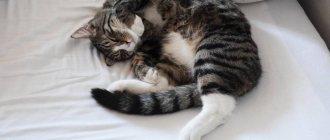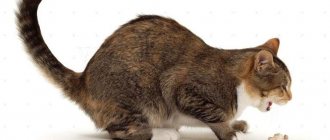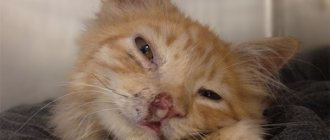Having adopted a purebred or ordinary cat into the family, we expect that it will be affectionate and obedient, create comfort in our home, and provide stress relief for the family. But in practice it turns out completely differently - without having time to adapt, the cat begins to show character and demonstrate undesirable behavior. When you decide to get a pet, be prepared not only for scratched furniture and annoying meowing at night, but also for stinking puddles that can appear anywhere, including in the owner’s bed - right on the white sheets. This happens not only at the stage of accustoming a kitten to the tray, but also at any other time. Such behavior does not arise just like that; it is provoked by certain reasons. Why a cat pees on the bed will be discussed below in the article.
The cat pees on the bed, the main reasons
Stress, strong emotional experience, disruption of the usual way of life - these are not all the reasons why a cat pisses on the bed and other places. Ignoring the litter tray by an animal may indicate the development of systemic diseases of the internal organs. It would be a good idea to show it to a veterinarian to rule out serious pathologies that could cost the pet’s life. Let's look at the main reasons why a cat pees on the bed, and then we'll figure out what to do about it and how to stop your pet from pooping in the wrong place.
How to train to a tray?
If you have determined why your cat is peeing on the bed, then training your pet to use the litter box will be much easier. Let us briefly repeat our recommendations:
- Cover the bed with oilcloth for some time.
- Eliminate the smell of cat urine in your bed.
- Spray your bed with lavender or citrus essential oil.
- Place several trays with different fillings and provide easy access to them. Trays must be placed in a safe place.
- Don't let your pet into other rooms. Create comfortable conditions for him in one enclosed space. Place a cat house there and leave toys.
- Use a diffuser with a sedative.
- Place your pet in the litter box after every meal.
- Praise your pet after each successful visit to the toilet.
Stress and strong emotional tension
Cats are susceptible to stress caused by fear, excitement, jealousy, changes in their usual daily routine, trips to the veterinarian, or moving to a new place of residence. A strong emotional shock can cause unwanted behavior in an animal, in which it forgets its “toilet” skills and begins to shit anywhere, even on the owner’s bed. This is how the cat expresses its emotions and calls on its owner for help. It is impossible to strongly scold or physically punish a pet for this offense; on the contrary, you need to show maximum attention to it. We recommend showing more affection, care and communication to the animal in anticipation of possible stressful situations, which include:
- change of place of residence;
- traveling by car or public transport;
- journey;
- arrival of guests;
- the appearance of a small child in the house;
- the appearance of another pet, etc.
If a puddle on the bed is caused by a stressful situation, it is important to prevent the animal’s unwanted behavior from becoming established.
Recommendations
If the kitten was taken from the street, he had no restrictions on the choice of place to defecate. Then he may not understand the prohibition that you can’t pee in bed.
To wean a kitten in a week, read the recommendations:
- Create an unpleasant sensation in the animal at the moment when he is about to pee on the bed. Repel him with aluminum foil placed on the bed. The kitten will step on it, get scared by the rustling sound and run away.
- Play with your pet on the bed, sleep together. In this way, he will develop the understanding that “a bed is not a toilet.”
- Place the kitten's tray in a special place in the house.
- To prevent the kitten from peeing, spank it with a wet rag, spray its face with water from a spray bottle, and then immediately transfer it to the tray. When he finishes his business there, pet him and praise him.
- Cats are repulsed by strong scents. Place a sachet of lavender or any other strong-smelling ingredient in your bed. Avoid experiments with oregano and mint, they attract animals.
- The kitten can see the mother cat in the owner. When they are together, the baby pees on the bedding. In the house it can be replaced with a soft bed.
- The tray should be comfortable, long and spacious enough so that he can unfold it without difficulty.
- If a small kitten has managed to do its job in bed, it still needs to be taken to the tray, but kindness and affection cannot be demonstrated. Express your dissatisfaction with his behavior, leaving him there to “think about your action.”
- Until the animal has firmly learned that it only needs to go to the litter box, forbid it from sleeping in bed with you. The house and bed are suitable as an alternative to a bed. The toilet should be placed next to them.
- The toilet should be made attractive; after cleaning, treat it with a smart spray, then the kitten will be ready to go to the litter box again.
- Cats are clean and will not go to the dirty toilet. A couple of stuck together lumps can scare them away, change the filler or immediately remove the dirty lumps.
- Choose a litter that your kitten will like: clumping, absorbent, wood, silica gel.
- Sometimes the reason is that a particular blanket or blanket is attractive to the kitten, its texture is pleasant for the paws, especially if the tray provided by the owners causes inconvenience.
- Stress may be the cause. It occurs due to moving, a change of environment, owners, or the appearance of other animals in the house. In this case, caress and soothing herbal remedies will help. The doctor will tell you which one to choose.
- If the kitten begins to walk past the bed and pees on chairs, sofas and armchairs, this indicates health problems: cystitis, infection, problems with the urinary tract. At the same time, he will often pee, and sometimes he will not have time to run to the tray. You can understand the reason by contacting your veterinarian.
Preventive measures will not give the expected result if the kitten is sick or worried about changes that are incomprehensible to it. A patient, attentive attitude towards a pet in case of any failure gives better results than physical punishment, screaming and threats. Pets are family members just like the rest of the household. Comfortable living conditions, protection from diseases, a properly selected diet and a convenient, accessible potty will help to avoid problems and conflicts.
Problems with the tray
Domestic cats and cats relieve themselves in a special tray with filler. Kittens are accustomed to it at an early age. Even if the training process goes quickly and smoothly, there is no guarantee that the animal will go to the litter box regularly throughout its life. Refusal from the usual “toilet” provokes:
- unsanitary condition of the tray, which is caused by improper and irregular care;
- the presence of foreign odors - even if a cat catches a barely perceptible smell of its own feces, it will go to relieve itself in another place, this is inherent in it at the genetic level;
- change of filler or its absence - unusual sensations can turn the animal away from the usual tray and force it to look for another place to discharge its natural needs;
- a new tray or a change in the location of the old “toilet” causes confusion in the cat - the animal does not know how to behave in the current situation.
If you are wondering why the cat peed on the bed , check whether her access to the litter tray was blocked; perhaps the door to the bathroom, where the cat litter is usually located, was accidentally tightly closed by someone in the household.
Cleanliness and force of habit
Just like people, cats have their own preferences, which also apply to the toilet. When organizing a “latrine”, the owner should pay close attention to various details:
- Regardless of the shape, size and type of filler, the tray must be clean . Many owners note that their pets do not go to the toilet if there is even a “hint” of previous bowel movements in it. Some cats furiously “bury” the puddle until the owner cleans it up. Such “cleanliness” is, rather, caution. Indeed, in nature, feces and urine “give away” animals and can bring “uninvited”, dangerous guests into the lair. However, for most animals, it is enough for the tray to be cleaned regularly and the litter to be partially replaced. In this case, once a week it is necessary to completely replace the material and thoroughly clean the container itself.
- Tray size . Often, owners, having once bought a litter box for a kitten, forget to replace it with a larger container. It becomes very problematic for a significantly older cat to “relieve” itself on the “children’s potty”, and he goes in search of a more convenient place. The tray should be long enough and moderately deep so that the cat can turn around in it and rake in the way it is comfortable for her. There are also rough estimates on this score - the length of a suitable container is 50% greater than the length of the animal’s body. Of course, the tail is not taken into account in this case.
- Tray location . Most cats value comfort and privacy, which means it is recommended to place the litter tray away from drafts and prying eyes. Particularly shy individuals require closed containers equipped with walls and a lid. As a rule, a suitable tank is selected empirically, based on the individual preferences of the pet.
- Number of trays . If the animal is extremely clean, then experienced owners advise placing 2 containers at once. The latter is especially important when the owner is often away from home for a long time and cannot clean the litter box every time the pet goes into it. Two cats will need 2-3 trays, and three cats will need 3-4...
- Cleaning with disinfectants. Chlorine-containing products and a vinegar solution work well against odors, urinary stone deposits and various pathogens. However, these same products have a pungent odor and are often used to stop a cat from peeing anywhere. What to do in this case? First of all, you should wash the tray regularly using regular laundry soap, rinse it thoroughly and wipe it dry. If you do this in a timely manner, the container will remain clean without any signs of stone or “bad amber.”
Diseases and hormonal storms
Practice shows that puddles on the owner's bed are often left by uncastrated cats and unsterilized cats during hormonal storms, which provoke unwanted behavior. Veterinary pharmacies offer a selection of hormonal medications that will calm the animal. If you do not plan to breed purebred offspring, consider castration or sterilization of your pet.
In the wrong places, cats and kittens can begin with the development of serious diseases of the internal organs:
- urolithiasis;
- intestinal pathologies.
The appearance of puddles on the owner's beds causes inevitable aging of the animal. Older cats suffer from Alzheimer's disease, which is characterized by a loss of toilet skills. The owners can only understand and forgive the aging animal.
How to stop an animal from damaging furniture
Having determined the reasons for the appearance of puddles or marks on the bed, it becomes easier to understand how to stop a cat from shitting on the bed. It should be noted that you cannot become aggressive, use brute physical force on the animal, or poke its nose into a puddle. This will aggravate the situation and increase the animal’s stress. You need to control yourself. The only acceptable punishment is to explain to the cat in a stern voice what she is doing wrong. Animals will understand perfectly well that the owner is unhappy.
All soiled pillows, bed linen, blankets, bedspreads must be thoroughly washed, stains and unpleasant odors removed. Then dry everything. If possible, dry clean the mattress. Make the bed with clean, different linens. Since cats rely on smell, it is very important to remove it.
Next, it is recommended to inspect the tray. Rinse it even if it is dry and clean. Sometimes droplets of urine remain on the tray, which the owner does not notice. The animal, sensing the smell, refuses to write and goes off in search of a new place. If a puddle appears on the bed after changing the filler or tray, you need to return everything as it was. If a small child or another family member appears in the family, cats need to be given enough attention. They will experience stress from any changes and are jealous of it. The cat needs to be picked up, caressed, and treated to treats more often. Animals are also given sedatives of plant origin. The preparations are natural and will not harm the cat’s health.
If all the described external reasons are not reflected in a specific situation, it is recommended to consult a veterinarian. Perhaps the animal suffers from a disease and therefore pees in the wrong place. The veterinarian will take the necessary tests and perform an examination. These measures will help determine the disease of the animal. Treatment will also be prescribed in more severe situations - surgery.
If a small kitten is mischievous, you need to treat the situation with patience and understanding. Take your baby to the litter tray more often. The best time is immediately after sleep or eating. If the kitten has passed correctly, it is recommended to praise it and treat it with a treat. Constantly reminding your baby of the place where he should defecate will bring results over time.
Another recommendation concerns urolithiasis, which often affects especially castrated and sterilized cats. It is necessary to regularly do rapid tests and visit the veterinarian. Constant examination will allow you to promptly identify the first signs of the disease and begin treatment on time.
Cats are demanding, they are jealous of the appearance of new family members and other animals in the family. The reason for the “surprise” on the master’s bed can also be diseases and age-related characteristics of their body. Animals need support and help from their owners. An attentive attitude will bring more benefits than nervousness, aggression and physical punishment.
The cat pees on the bed, what to do
There is no single algorithm of actions for weaning a cat from shitting on the bed. The first thing caring owners need to do is to try to find out the cause of the unwanted behavior and eliminate it immediately, including with the help of a veterinarian.
You cannot shout loudly or use physical punishment at the culprit of the stinking puddle - this will provoke unnecessary aggression and resentment. If your pet continues to pee on the bed, tell him not to do so in a stern voice.
Additionally, it is recommended to check the cleanliness of the tray, its correct location and the quality of the filler. Show maximum attention to your pet, let him feel your care. The problem of puddles on the bed disappears as quickly as it appears.
Getting rid of stains and odor
How to remove odor and stains? They are eliminated using special products that are sold in pet stores or folk remedies. In this case, you will have to treat every area in the room. The process is quite labor intensive. To avoid a situation where a cat shits on the bed, it is necessary to wean the animal from a bad habit.
Folk remedies
It is difficult to remove stains and unpleasant odors from the bed. This is especially true for marks. Folk remedies used to get rid of odor:
- The aroma of citrus fruits repels cats, and the acid helps neutralize odors. To do this, squeeze lemon juice, dilute with a glass of boiled water, wipe the surfaces;
- Dilute vinegar removes stains and odors well;
- Baking soda with hydrogen peroxide 3% (suitable for hard surfaces only);
- Alcohol or vodka – thoroughly wipe the stained area with a sponge soaked in vodka or alcohol;
- Potassium permanganate - will eliminate odor, but is only suitable for dark-colored fabrics, not delicate ones.
Under no circumstances should you use bleach to eliminate odors. The product will worsen the situation and may act as a sleeping pill on cats.
Lemon juice
Vinegar
Baking soda and hydrogen peroxide
Alcohol
Potassium permangantsovka
Radical methods
Radical methods are started when there is nothing else left. If the owner does not intend to breed cats, the best option would be castration for cats or sterilization for cats. The procedure should help, and the cat will stop marking the territory. It is important that the animal be neutered before it has contact with the cat. Otherwise, this radical method may not help. Males are usually neutered before the age of 1 year. After the procedure, it will take several more months before the animal stops marking. During this time, the body undergoes a restructuring.
Preventing bad behavior
It is easier to prevent stinking puddles on the bed than to fight their appearance. To do this, you need to try to eliminate stressful situations for your pet as much as possible. They can be:
- loud quarrels and scandals in the house;
- the appearance of strangers;
- changing your usual routine, etc.
It is better to keep the bedroom door closed, and sprinkle the bed with lemon, orange or lavender essential oil. These aromas are unpleasant for the cat; it is unlikely that he will shit where he smells such a smell.
Preventive measures will not give the desired result in the event of an animal illness or a raging hormonal storm in its body. Be attentive to your pet, restrained and patient, show him attention and care, he will respond to you with good behavior. A calm atmosphere in the house, proper and balanced nutrition for the cat, free access to the litter tray will save you from problems with the one you took into your home, loved and tamed.
Territory marker
The most common reason for the appearance of “fragrant surprises” outside the tray is a territory mark. Most often, males “sin” with this, doing this all year round. But females, at certain moments in life, can begin to “mark” corners, furniture and other places that are important, from their point of view. This behavior is mainly observed in cats during estrus.
Sterilization. It is impossible to wean your pet from this behavior, but the problem can be solved by sterilization. True, you shouldn’t expect lightning-fast results:
- Even after a successful procedure, the animal requires several days to recover. And before that, the pet may not have time to get to the tray.
- Neutered cats often continue to leave marks in their homes. This is due to the fact that changes in hormonal levels require a certain time, most often several weeks. But when everything stabilizes, the pet will forget about the “bad habit.”
- It is very important to seek qualified help. After all, if the operation is performed by an inexperienced specialist, then the risks of developing postoperative complications, for example, urinary incontinence, are high.
It is recommended to spay and neuter your pets before they reach sexual maturity. Cats - until the first emptying, cats - before the start of sexual hunting.
Animal conflict
Sometimes one of the cats starts walking on the bed. In this case, it is important to see if another animal is using his litter box. You can also try to place the trays in different places and stop attempts by another animal to use the tray of their friend in the apartment.
Pregnant cats may also start peeing on the bed. They begin to be annoyed by the presence of other people's trays and smells nearby.
In this case, you can also try moving the cat’s litter tray to another secluded place.
Eliminating the smell
Be that as it may, in many cases the cat prefers to go to bed rather than make a puddle in the hallway. And the reason for this is your smell, which is very pleasant to her, or her smell remaining after sleep. In both cases, an odor neutralizer that should be used on the bed will help.
If you have several cats, one of them can thus mark its territory. And an odor neutralizer will also help with this.
At the same time, products are sold that have a very unpleasant odor for cats, but at the same time, they are perceived absolutely neutrally by people. They can also be used to treat the bed. And this will help stop them from peeing on your bed.
Your cat doesn't like the type of litter box you have.
It's time to take another look at cat establishments.
Maybe the litter box has a cover that traps odors or restricts her movement so she can't get into a comfortable position to pee without pressing part of her body against the inside of the cover, which many cats don't like.
Or it could be a medical problem combined with a poorly fitting cat litter box. If your cat has arthritis, the sides of the box may be too high, making it difficult to get in and out.
What measures to take
In order to understand how to correct the animal’s behavior, it is necessary to establish the reason why it began to use the entire house as a toilet. Once this reason has been established, it is not necessary to punish the cat who has pooped - sometimes you can return it to the litter box using gentler methods.
What to do for skeptics
All people, regardless of whether they believe in omens or not, need to remember that it is necessary to accustom a kitten to the litter box from the first days of life. However, teaching your four-legged pet to relieve itself in a specific place in the house is still half the battle. Next, you need to make sure that the litter in the cat litter is always fresh and the tray itself is clean, otherwise the cat may start looking for another litter box.
If everything is in order with the tray and your four-legged friend has long been accustomed to it, but suddenly begins to mark the master’s bed or other objects in the home, then the following will help wean him from bad actions:
- If the animal is sick (diarrhea or disease of the genitourinary system), then it must be shown to a veterinarian, who will prescribe treatment for the cat. As a rule, a recovered pet returns to the tray on its own.
- If a cat is offended by a person and takes revenge on him for something, then the owner would do well to try to understand why this happened. Perhaps the cat felt that the owner’s love for her had decreased due to a new family member (child) or another animal appearing in the house. In this case, the owner of a four-legged pet should show more attention to it for some time. It’s not worth punishing a cat for a shitty shoe or bedspread. It will be enough to defiantly ignore him after each such incident. And, conversely, after any proper trip to the litter box, pet the cat and give him his favorite treat.
- If a purr craps all over the house because he is already old and simply does not have time to get to the litter box, and the owner loves him so much that he does not want to put him to sleep, then the solution may be to install another cat litter box in another place. It is easy to accustom an old cat to such a toilet by placing any object that carries the smell of her urine in the spare tray.
- The worst option is when a young male cat urinates on the furniture and belongings of the owners, marking its territory. In this case, it is sometimes impossible to return it to the tray using normal methods, even if you treat all marked places and objects in the house with chemicals that repel strong odors. The only method to wean an animal from improper actions is castration.
What should superstitious people do?
For those who believe that cats connect the human world with the subtle other world, esotericists give some advice on how to wean your four-legged pet from walking past the litter box:
- If a cat shits on the bed of an owner who is already sick or prone to illness, then the person should try to clean his house to avoid the illness or death predicted by the furry soothsayer. Daily reading of prayers, blessing the house with lit church candles, fumigation with incense, and also wearing a special amulet will help cleanse your home.
- Those who are sure that a kitten pooping on the bed predicts a quick financial profit can be advised to strengthen the effect of the prediction by additionally charging the home with material well-being with magical rituals and talismans.
- Cats anticipate future quarrels between family members, especially between spouses, so it would be a good idea for the owners of the crapping animal to analyze their own behavior and try not to lead to family conflicts. Then the cat will not mark the marital bed.
- If a cat constantly shits on the same thing, then perhaps the owner of a four-legged pet should listen to the furry “esotericist” and throw this thing out of the house, since it poses a threat to all family members with strong negative energy.
Every person, when getting a kitten, wants to receive only positive emotions from their pet. But sometimes there are embarrassments with the latter. However, instead of scolding a naughty pet or trying to correct its behavior in the usual ways, sometimes it can be useful to “listen” to what the four-legged soothsayer is trying to say and check your own health or the things he has soiled. It is possible that this will help the cat owner not only avoid some kind of disease, but also protect himself from something more terrible.
Read with this
- How does a toilet nozzle work?
- Why do cats bury food? Why do cats bury food next to the water bowl after they eat? why do cats do this every time?
- How can you stop a cat from pooping in the wrong place?
- An expression of love or a way to relax: why do cats purr?
- What does a ginger cat bring into the house, what does it stick to: signs, beliefs and superstitions
- Castration of a cat: pros and cons. cat behavior after castration
- Your cat's strange behavior: how to decipher it
- How to stop a cat from tearing up wallpaper and furniture
- Why does a cat sleep a lot: sleep norms in adults and small animals
- How long do cats sleep per day?
How to stop a cat from pooping all over your apartment: proven methods
It is not at all difficult to train a small kitten to use a litter tray. But if an adult cat suddenly changes its habits, or the animal is taken from the street, only those who show patience and love will achieve success.
The owner needs to show the cat that he is against him shitting anywhere and take care of cleanliness:
- the dirty floor is immediately washed and disinfected;
- it is possible to use an odor repellent;
- soiled shoes are thoroughly cleaned and put away.
Many cats urinate in one litter box and defecate in another. In this case, the problem can be solved in the easiest way: just place two containers next to each other.
If the cat is left alone for a long time, you will have to get another potty, because this animal will not go into a dirty container.
Sometimes it is enough to change the brand of litter to the one the cat is used to. If there is a need to accustom the cat to a different litter, the change is made gradually, mixing the new brand with the old one in increasing proportions.
After making sure that the animal is healthy, you can apply educational measures:
- give a treat every time the cat goes into the litter box: to positively reinforce correct behavior;
- put a bowl of food where it is pooped: cats do not go to the toilet where they eat;
- in cases where “you can’t stock up on any bowls,” you can lay out dry food in areas that have been thoroughly washed of urine or feces beforehand.
If the cat gets into the habit of walking on any object that can be removed for a while (a rug, a chair), then it is better to take the thing out altogether or stop the cat’s access to the room. But it cannot be guaranteed that, having stopped shitting in the wrong place for some time, even for a long time, the cat will not eventually begin to use this thing as its toilet again.
A very effective way for a small kitten is to soak a cloth in his urine and put it in the tray. The smell will point the animal to the right place. The same can be done for an adult cat brought from the street.
A good method is to place the tray where the cat began to shit, gradually moving it to where the owner needs it. Often the cat obeys or does not notice the change in the position of the potty. But sometimes you have to come to terms and permanently move the tray to the corner chosen by the animal.
You can make a place favored by a cat inaccessible:
- cover with something that is better unpleasant for the paws;
- fence with a strip of double-sided tape;
- make inaccessible (fence, cover).
Sometimes it turns out to be effective to create a situation of discomfort at the moment when the cat settles down in the corner of its choice (unexpected appearance, clapping of hands). But the animal always understands that it is doing something bad, and tries to do it when no one is around. The owners will have to keep watch, and perhaps more than once.
To prevent a cat taken from the street from marking the entire apartment, you can collect its scent on a porous fabric (by rubbing it on the fur, for example) and spread its pieces around the apartment. Then the animal will understand that this is its territory, which does not need to be marked.
To prevent pets from spraying gonad secretions and urine around the apartment, males are castrated and females are sterilized. But if this is done late, when the behavior has already become entrenched, the operation will not get rid of the marks. Your veterinarian will help determine the correct age for this procedure.
An animal that shits in the wrong place in order to find a sexual partner can simply be given the opportunity to satisfy its instinct, and silence and cleanliness will return to the apartment.











